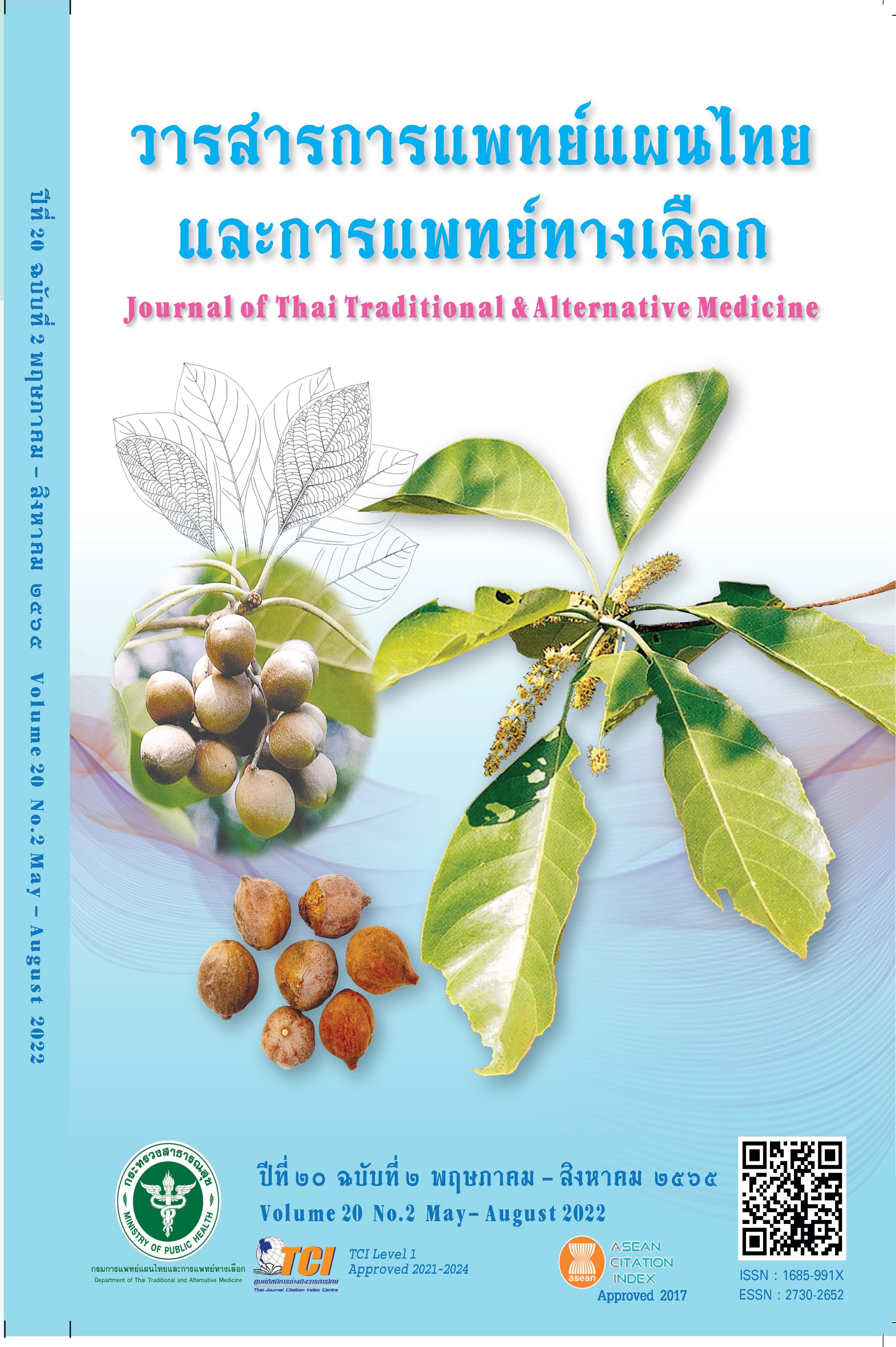Prescribing Patterns, Safety and Effects of Suk Sai-Yad Thai Traditional Medicine Formula on Patients’ Quality of Life
Main Article Content
Abstract
Suk Sai-Yad formula is a Thai traditional medicine (TTM) formula containing cannabis recorded in the Royal Scripture of King Narai’s Traditional Medicine. This formula containing 15.38% of cannabis leaves is recommended by the Department of Thai Traditional and Alternative Medicine and the Thai Traditional Medicinal Council for the treatment of patients with insomnia and loss of appetite. In the past, although cannabis was used as an ingredient in TTM remedies for a long time, when cannabis was classified as a schedule 5 narcotic under Thailand’s Narcotics Act B.E. 2522 (1979), medical use of cannabis-containing TTM preparations became illegal. Moreover, research and scientific evidence on its efficacy, safety, and patterns of use was also limited. This study aimed to determine prescribing patterns, adverse events, and quality of life of patients receiving Suk Sai-Yad formula. Therefore, a retrospective cohort study using a patient record review was conducted on patients visiting the Medical Cannabis Clinic at the Thai Traditional and Integrated Medicine Hospital for at least two visits from October 2019 to December 2020 and having follow-up treatment every month. A total of 138 patients (61.59% males and mean age 56.81 ± 15.51 years) participated in the study. The formula was prescribed for insomnia (87.68%), headache (7.97%), and other indications (4.35%) including loss of appetite, numbness and Parkinson’s disease. The initial doses were 0.5–2.0 g/day and the most prescribed initial dosage regimen was 1 g once a day (52.90%). Common maintenance doses prescribed were 2.0 g/day (44.18%) and 1.0 g/day (40.70%). Fifteen patients discontinued medication because of drug ineffectiveness. Researchers observed 31 adverse events in 23 patients, namely gastrointestinal irritation (7.97%), dizziness/headache (5.79%), dry mouth and dry throat (4.34%). Sixteen patients (11.59%) discontinued medication because of adverse effects. The quality of life measured using the EQ-5D-5L self-assessed questionnaire indicated that the average utility was 0.95 ± 0.11 at treatment initiation and 0.98 ± 0.05 (P < .001) after 3-month treatment. In conclusion, it was found that despite a few non-serious adverse effects, Suk Sai-Yad formula is a safe and effective alternative medication that can improve the quality of life for patients with insomnia.
Article Details

This work is licensed under a Creative Commons Attribution-NonCommercial-NoDerivatives 4.0 International License.
References
Taupachit W, Kessomboon N. Medicinal use of cannabis. Isan J Pharm Sciences. 2017;13(Supplement):228-40. (in Thai)
Narcotics Act B.E. 2522 (1979). Published in Government Gazette, Vol. 96, Part 63. (1979 Apr 27). (in Thai)
Narcotics Act (No. 7) B.E. 2562 (2019). Published in Government Gazette, Vol. 136, Part 19A. (2019 Feb 18). (in Thai)
Notification of the Ministry of Public Health on Prescribing schedule 5 narcotic medicines, containing cannabis as an ingredient, that can be consumed for the treatment of diseases or for research B.E. 2562 (2019). Published in Government Gazette, Vol. 136 Special Part 94D. (2019 Apr 11). (in Thai)
Notification of the Committee on the Development of National Medicine System on National list of essential herbal medicines B.E. 2564 (2021). Published in Government Gazette, Vol. 138 Special Part 103D. (2021 May 14).
Notification of the Ministry of Public Health on Specifying
schedule 5 narcotics B.E. 2563 (2020). Published in Government Gazette. Vol. 137. Special Part 290 D. (2020 Dec 14). (in Thai)
Notification of the Ministry of Public Health on Prescribing schedule 5 narcotic medicines, containing cannabis as an ingredient, that can be consumed for the treatment of diseases or for research B.E. 2564 (2021). Published in Government Gazette, Vol. 138 Special Part 35 D. (2021 Feb 15). (in Thai)
Protection of Thai Traditional Medicine Knowledge Office, Department of Thai Traditional and Alternative Medicine. Kampee That Phra Narai, palm leaf edition. Bangkok: War Veterans Administration Printing; 2012.
p. 89. (in Thai)
Department of Medical Services. Guidance on cannabis for medical use, Version 4. Nonthaburi: Department of Medical Services; 2021. (in Thai)
Lueangchiranothai P, Palawong S, Kamol T. Effectiveness
of cannabis extract at medical cannabis clinic in Lampang Hospital. J Thai Trad Alt Med. 2021;19(1):19-33. (in Thai)
Bhagavan C, Kung S, Doppen M, John M, Vakalalabure I, Oldfield K, Braithwaite I, Newton-Howes G. Cannabinoids in the treatment of insomnia disorder: A systematic review and meta-analysis. CNS Drugs.
;34(12):1217-28.
Tengtermwong N. Effectiveness and safety of Suk Saiyad herbal remedy for chronic insomnia: A preliminary retrospective study in Chao Phya Abhaibhubejhr Hospital. J Thai Trad Alt Med. 2021;19(2):331-43. (in Thai)
Tipratchadaporn S, Srita J, Pomchaiya P, Boonyawan S, Silarak K. Benefit and safety of Suk Sai-yad traditional medicine recipe in patients with insomnia. J Thai Trad Alt Med. 2021;19(2):317-30. (in Thai)
Pattanaphesaj J. Health-related quality of life measure (EQ-5D-5L): measurement property testing and its preference-based score in Thai population (Doctoral dissertation). Nakhon Pathom: Mahidol University; 2014.
Department of Thai Traditional and Alternative Medicine. Guidance on the use cannabis in Thai traditional medicine. Nonthaburi: Ministry of Public Health; 2019. (in Thai)
Myers BM, Smith JL, Graham DY. Effect of red pepper and black pepper on the stomach. Am J Gastroenterol. 1987;82(3):211-4.
Pratt M, Stevens A, Thuku M, Butler C, Skidmore B, Wieland LS, et al. Benefits and harms of medical cannabis: a scoping review of systematic reviews. Syst Rev. 2019;8(1):320.
Deshpande A, Mailis-Gagnon A, Zoheiry N, Lakha SF. Efficacy and adverse effects of medical marijuana for chronic noncancer pain: Systematic review of randomized controlled trials. Can Fam Physician. 2015;61(8):e372-e81.


